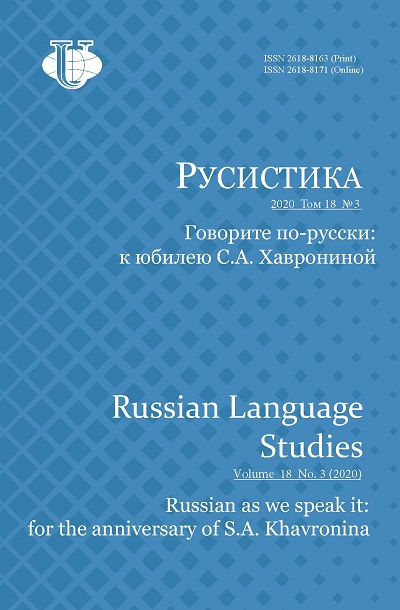The history of teaching the Russian language in Lebanon: a chronological overview starting with the “Moscow school” of the Imperial Orthodox Palestine Society until present times
- Authors: Semaan N.V.1, Demesheva E.N.2, Baher T.V.3
-
Affiliations:
- Russian Center for Science and Culture
- Lebanese University
- Lebanese Cultural Orthodox Imperial Society
- Issue: Vol 18, No 3 (2020): RUSSIAN AS WE SPEAK IT: FOR THE ANNIVERSARY OF S.A. KHAVRONINA
- Pages: 271-294
- Section: Scientific Review
- URL: https://journals.rudn.ru/russian-language-studies/article/view/24497
- DOI: https://doi.org/10.22363/2618-8163-2020-18-3-271-294
- ID: 24497
Cite item
Full Text
Abstract
The article is dedicated to the history of teaching the Russian language in Lebanon from the end of the XIX century to present times. The authors tried to analyze how the pivotal historical moments of Russian-Lebanese relations influenced the conditions for teaching the Russian language in Lebanon. The article provides a brief description of the programs and methods used in various educational institutions for teaching Russian in Lebanon, depending on the form in which it was in demand for its functioning (at one stage or another). First as a language taught in some “Moscow schools” of the Imperial Orthodox Palestine Society, then as a language for preserving the Russian culture of the Diaspora initially formed by first wave immigrants and finally at the present stage, Russian as a foreign language or as a native language for bilingual children of compatriots living in Lebanon.
About the authors
Nataliya V. Semaan
Russian Center for Science and Culture
Author for correspondence.
Email: haidarnat@yahoo.com
Candidate of Philology, lecturer of the Russian language and literature at the external school of the Embassy of the Russian Federation in the Lebanese Republic, Head of the Russian language school for bilingual children “Kedr” at the Russian Center for Science and Culture in Beirut, Chairperson of the Lebanese Society of Teachers of the Russian Language and Literature (LOPRYAL).
Rachid Karame St., Beirut, 7883, Lebanese RepublicElena N. Demesheva
Lebanese University
Email: elena.demesheva@ul.edu.lb
Candidate of Pedagogy, lecturer at the Faculty of Philology and Humanities in the Lebanese University, at the Department of International Affairs of Faculty of Arts and Sciences in the American University of Science and Technology, instructor at the Russian Center for Science and Culture in Beirut. Research interests: methods of teaching Russian as a foreign language to an Arabic-speaking audience outside native linguistic and cultural environment, Russian and Arabic phraseology, linguoculturology, linguodidactics, intercultural communication
P.O. Box 14/6573, Dekwaneh, Lebanese RepublicTatiana V. Baher
Lebanese Cultural Orthodox Imperial Society
Email: tatiana.baher@yandex.ru
member of the Lebanese Cultural Orthodox Imperial Society in Amion
Chaouki Al Chammas Bldg., Liban Nord Abdallah Saadeh Blvd., Amioun, 32111, Lebanese RepublicReferences
- Anichkov, N.M. (1899). Izvlechenie iz otcheta Predsedatel'stvuyushchego v otdelenii podderzhaniya pravoslaviya N.M. Anichkova po osmotru im vesnoyu 1899 g. uchebnykh zavedenii Obshchestva v Palestine i Sirii [Extract from the report of the Chairman of the Department of Maintaining Orthodoxy N.M. Anichkov on his inspection of the Society's educational institutions in Palestine and Syria in the spring of 1899]. IPPO Messages, 10, 656–691. (In Russ.)
- Baher, T. Kayut-kompaniya i kazach'ya stanitsa Beirutskaya [Kayut company and the Cossack village of Beirut]. Retrieved May 14, 2020, from http://www.ruvek.info/?module= articles&action=view&id=8997 (In Russ.)
- Baher, T., & Fedotov, P.V. (2012). “Moskovskie shkoly” Livana. 1887–1914 [“Moscow schools” of Lebanon. 1887–1914]. Beirut, Saint Petersburg: Alarm editions. (In Russ.)
- Cherkasova, M.A. (1911). Naiskoreishii sposob naucheniya chteniyu i pis'mu [The Fastest way to teach reading and writing]. For the glory of God (part II, pp. 40–51). Kazan: Tipografiya Gubernskogo pravleniya Publ. (In Russ.)
- Demesheva, E.N. (2006). Influence of the language situation in the Arab countries on the methodology of teaching Russian as a foreign language (course profile). Proceedings from the Forum of rusists of Russia, North Africa and the Middle East: Collection of scientific and methodological articles and messages (pp. 44–51). (In Russ.)
- Grushevoi, A.G. (2015). Schools and school activities of the Imperial Orthodox Palestinian Society (Oriental studies and Orientalists in the ideology and political system of the Russian Empire). Auxiliary historical disciplines, 33, 57–118. (In Russ.)
- Grushevoi, A.G. (2018). The Latest curriculum of teachers' seminaries of the Imperial Orthodox Palestinian Society. Bulletin of the Yekaterinburg Theological Seminary, 2(22), 258–331. (In Russ.)
- Krymskii, A.E. (1975). Pis'ma iz Livana (1896–1898) [Letters from Lebanon (1896–1898)]. Moscow: Nauka Publ. (In Russ.)
- Lisovoi, N.N. (2006). Russkoe dukhovnoe i politicheskoe prisutstvie v Svyatoi Zemle i na Blizhnem Vostoke v XIX – nachale XX v. [Russian spiritual and political presence in the Holy Land and the Middle East in the XIX – early XX century]. Moscow: Indrik Publ. (In Russ.)
- Nedopekina, E.M. (2011). Place and role of language in the formation of diasporas. Bulletin of Peoples’ Friendship University of Russia. Series: Theory of Language. Semiotics. Semantics, (1), 67–74. (In Russ.)
- Ustav Pravoslavnago Palestinskago Obshchestva [Charter of the Orthodox Palestinian Society] (from May 8, 1882). Saint Petersburg: V. Kirshbaum Publishing House. (In Russ.)
- Vorobev, S.A. (2010). Russkie v Livane. Rossiiskie sootechestvenniki v Livane: Istoriya i sovremennost’: sbornik materialov [Russians in Lebanon: Russian compatriots in Lebanon: History and modernity: Collection of materials]. Beirut: CHAMAS for printing and publishing. (In Russ.)
Supplementary files














